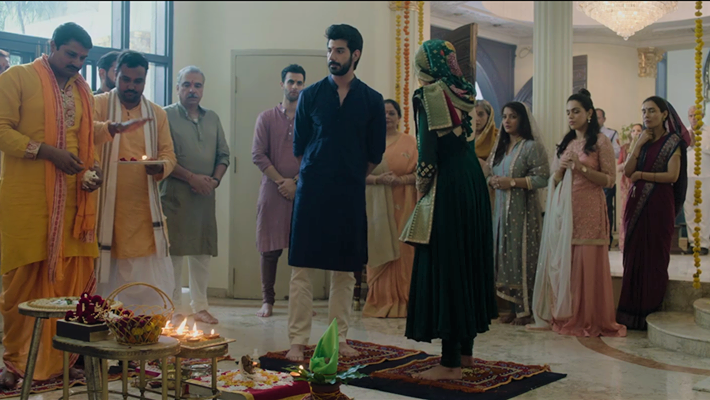Sruthi Herbert
*Spoiler Alert*
This article contains details of the plot which you may not want to know if you intend to watch the movie.
—
Without much ado, let me state that Thappad is a perfect brew of savarna feminism. I will explain why.
The plot is fairly straightforward and is set in the upper caste world. Amritha, called Amu, a young woman from a middle-class family who is married into a more affluent family has a happy existence taking care of the home and the husband. Until one night, when in a party thrown to celebrate her husband’s work success, he gets into an altercation with his boss who dislikes him and slaps her in front of everyone. The slap changes her life; she questions her worth, especially in her husband and his family’s eyes. And understanding and apology not forthcoming from the husband, she takes the legal route. The divorce gets sometimes messy and ugly but also provides an opportunity to show the lives of her lawyer, her husband and her lover, her mother and father-in-law, her sibling and his girlfriend, and her maid, her husband, and mother-in-law. Many of the women are dealing with abuse and unhappiness: the lawyer, very successful herself, is a victim of marital rape, and the maid is regularly beaten up by the alcoholic husband. There are negotiations and dirty moves that make Amu and her lawyer get clarity on what each of them wants from life. The movie ends on a somewhat positive note where having finally secured an amicable divorce, a pregnant Amu and her ex-husband drive away in their respective cars to a future that may hold reconciliation and happiness.

I watched this movie because I had friends whose opinions I value speak highly of it. The title of the movie is apt; it is a ‘thappad’, a tight slap, that defines the course of the movie, and the lives of the characters in it. It is even aptly feminist in the Indian context if you see feminism as being in the service of the upper castes, yes, including the men. Because in this movie, it is not only that the upper caste woman is the victim who gets justice. It is also the upper caste men and their families that redeem themselves. The husband realises his mistake and looks willing to make amends; the mother-in-law realises how she did not treat Amu right; the father-in-law realises how he mistreated his wife; Amu’s mum and dad realises their daughter needs support, not coercion to return to her husband; her brother realises he has been a chauvinist for not seeing her side; the lawyer realises she got to leave her abusive marriage; heck, even the nasty boss comes out as the good guy! All through civil conversation and litigation (despite earlier dirty moves). The only permanent victim of domestic violence is the maid, the only family that cannot be redeemed is also hers. What best can be done, because civility doesn’t work with the bahujans, is even more violence and coarseness that keeps the abuse at bay.

This is what really struck me about the movie: the portrayal of the maid and her family as a prop and a perfect negative stereotype to be juxtaposed with the upper caste family that employs her. In fact, the movie and the story would have remained the same even if the maid and her family were taken out of the storyline. That would have made the narration more definitely about the upper caste family, which it is actually about anyway. The whole plot involving the maid serves no obvious purpose in the story except to discover the unconscious mummyji. So, why were they there? Perhaps because this way, the movie can claim to represent women’s oppression across classes. But more importantly, it helps to contrast with the uppercaste family and reinforce the stereotype of the abusive and coarse lower caste households against the civilised upper castes.
In fact, this movie makes clear again that feminism in India is not for everyone. And that it survives by defining itself against the lower caste women’s interests. Surely, the legal option accessible to Amu is not attainable for the maid. Also, unlike Amu, the maid probably cannot go home if she gets slapped once – which is why such a potential resolution for the maid’s situation almost sounds like nonsense. That is the reality of many Bahujan women – one slap cannot make you pack up and leave to your parents. As if they always will have a spare room to host you while you lounge around jobless, and as if it will not be a financial burden to support another adult and a baby that is on the way (not that despite this, bahujan families don’t), and as if the women themselves won’t know it. The movie, therefore, leaves all those realities unaddressed, resolving it with convenient stereotypes, while clearly defining the upper caste woman as the empowered woman.
You can ask: why did it never occur to Amu who knew about the maid’s situation to ever help her out? She does not show any understanding or identification with the maid, through their shared womanhood or victimhood. (If anything, the maid is also quite disingenuously portrayed to be on the side of the inconsiderate husband, asking Amu to let go). However, this portrayal is also to its credit: the absolute lack of connection that Amu or any other woman in the movie has with the maid, the fact that none of them show any interest in the world outside their own cocoon, that Amu has to say life is fair when she is looking after the family and the husband brings in the money, that she accepts the role of the wife and daughter-in-law happily until the slap happens – all of that might be just be fair depictions of most upper caste women and their choices.
If Thappad is a feminist movie, it does a good job of showing who this feminism serves. If it is not, it still does a good job of showing who feminism serves.
~~~
Sruthi Herbert is a Teaching Fellow at SOAS University of London
Images courtesy: Internet



